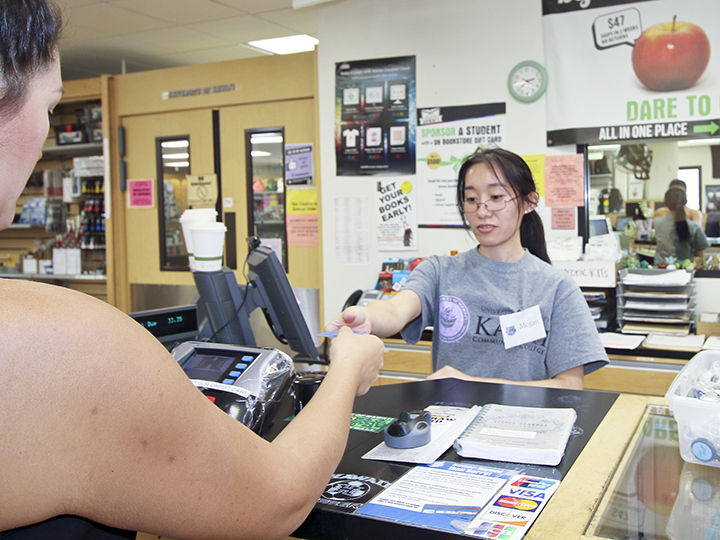LIHUE — Kauai Community College Chancellor Helen Cox’s initial reaction was joy. How the plan is put into practice still has to be figured out, but Cox’s first take from Friday’s announcement was that it was good news. “Obviously, it’s
LIHUE — Kauai Community College Chancellor Helen Cox’s initial reaction was joy.
How the plan is put into practice still has to be figured out, but Cox’s first take from Friday’s announcement was that it was good news.
“Obviously, it’s from the perspective of our community and students, which is that it would be fantastic,” Cox said about President Barack Obama’s proposal to provide free community college for students. “But one of the things we’d have to look at is, what does it mean? How would we afford that? But my first reaction was looking at it from the students’ perspective, and it’s fantastic.”
Obama’s proposal pledges to bring the cost of two years of community college “down to zero” for all Americans, an ambitious nationwide plan based on a popular Tennessee program signed into law by that state’s Republican governor.
However, the idea and its $60 billion federal price tag over 10 years would have to make the grade with a Republican Congress that is showing little appetite for big, new spending programs. Obama, who plans to push the issue in his Jan. 20 State of the Union address, argued that providing educational opportunity and creating a more skilled U.S. workforce shouldn’t be a partisan issue.
Whether the new method would affect state budgets in education or whether missing out on tuition fees would affect schools like KCC is yet to be seen.
KCC has a $13 million budget. About $10.5 million is provided by the state Legislature. Tuition and fees account for about $2.5 million.
“Obviously, there are a lot of things to work out, like how do we support ourselves,” Cox said of the college with 70 full-time faculty and 1,100 students enrolled. “But we’re obviously very excited … We know there are some people who don’t come here at all because of finances, or have to drop out because of finances, so to make community college free would be wonderful.”
While the proposal still needs Congressional approval, White House spokesman Eric Schultz said Obama will propose new programs to pay for the federal portion in his budget next month. The federal government would pick up 75 percent of the cost and the final quarter would come from states that opt into the program — a cost of $20 billion over 10 years.
Some KCC students said the proposal sounded like something that could help.
“I think it’s a great idea for students,” said Megan Higuchi, KCC first-year student. “It’s a good way for students to get a higher education.”
“The plan sounds really good for students who cannot afford to get into college,” second-year KCC student Nalani Mae Soboleski agreed.
A reason for the proposal, Obama said a high school diploma is no longer enough for American workers to compete in the global economy and that a college degree is “the surest ticket to the middle class.”
Daphne Sanchez, a junior learning at University of Hawaii’s West Oahu campus, said an associate degree isn’t even enough. Free community college could make a bachelor’s degree that much cheaper.
“The associate in arts is not enough,” she said. “You need at least a bachelor’s degree to be considered. My college experience has been very financially exhausting. I was able to get through my first two years without having to get a student loan. But as you get closer to graduation, there is less help and I finally had to get a student loan. This would have been great when I started. But it’s super encouraging for future students.”
A KCC student is considered full time at 12 hours, which costs $1,308 per semester for residents and $3,846 for non-residents. An associate degree requires 60 credits hours or slightly more for some fields. Cox said when students drop out, a majority of those who fill out a leaving survey cite financial difficulties as their reason
“I’m going to have to look more into this,” said Brandy Racca, a first-year KCC student. “It’s expensive to try and get a degree.”
The White House estimated that 9 million students could eventually participate and save an average of $3,800 in tuition per year if they attend full time. Students would qualify if they attend at least half time, maintain a 2.5 grade point average and make progress toward completing a degree or certificate program. Participating schools would have to meet certain academic requirements.
The proposal mirrors a program that was implemented in Tennessee. Obama brought Tennessee’s two Republican senators, Bob Corker and Lamar Alexander, with him on Air Force One for the event. But both said they thought states, not the federal government, should follow Tennessee’s lead.
“Creating a federal program to me is not the way to get good things to happen in education,” Corker told reporters from his seat in the third row of the speech. “You’re always better off letting states mimic each other.”
•••
Associated Press contributed to this report.


